
 |
|
November (2005) Cast: Courteney Cox, James LeGros, Nora Dunn, Anne Archer, Nick Offerman, Michael Ealy, Matthew Carey, Brittany Ishibashi, Robert Wu 2005 – 73 minutes Rated: Reviewed by Dustin Putman, August 13, 2005. 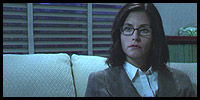 Finally receiving a theatrical release a year and a half after being an official 2004 selection at the Sundance Film Festival (where it deservedly won the Best Cinematography award), "November" is a compact 73-minute masterpiece. An awesomely constructed puzzle of a movie that, when finished interlocking all of its carefully woven pieces, creates a deeper and more three-dimensionally substantive whole than originally expected, director Greg Harrison (2000's "Groove") has made a dream picture for both psych majors and anyone with a taste for more offbeat, narratively complex fare reminiscent of David Lynch's (2001's "Mulholland Drive") abstract storytelling.
Finally receiving a theatrical release a year and a half after being an official 2004 selection at the Sundance Film Festival (where it deservedly won the Best Cinematography award), "November" is a compact 73-minute masterpiece. An awesomely constructed puzzle of a movie that, when finished interlocking all of its carefully woven pieces, creates a deeper and more three-dimensionally substantive whole than originally expected, director Greg Harrison (2000's "Groove") has made a dream picture for both psych majors and anyone with a taste for more offbeat, narratively complex fare reminiscent of David Lynch's (2001's "Mulholland Drive") abstract storytelling.
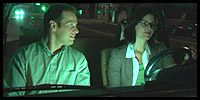 "November" will not be easily digestible for mainstream audiences who require things spelled out for them, but step back and run through the scenes and details in your mind once it's over and the film begins to make perfect sense. Because of that valuable element of unknowing that director Harrison relies so heavily on to garner intrigue for the duration of the running time, it is difficult to discuss what is real, what is symbolic, what is imagined, and what is dreamed, if, in fact, anything is. What can be said is that screenwriter Benjamin Brand has developed a beautifully intricate maze of scenes, all faultlessly conceived and placed, never cheating his audience or getting too showy and cute; each moment has a distinct purpose, and they collectively paint a heartbreaking portrait of the difficult grieving process and the unpredictable frailty of each singular life.
"November" will not be easily digestible for mainstream audiences who require things spelled out for them, but step back and run through the scenes and details in your mind once it's over and the film begins to make perfect sense. Because of that valuable element of unknowing that director Harrison relies so heavily on to garner intrigue for the duration of the running time, it is difficult to discuss what is real, what is symbolic, what is imagined, and what is dreamed, if, in fact, anything is. What can be said is that screenwriter Benjamin Brand has developed a beautifully intricate maze of scenes, all faultlessly conceived and placed, never cheating his audience or getting too showy and cute; each moment has a distinct purpose, and they collectively paint a heartbreaking portrait of the difficult grieving process and the unpredictable frailty of each singular life.
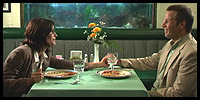 In a significant departure from the lighter work she usually receives, Courteney Cox (2005's "The Longest Yard") is mesmerizing in an understandably low-key way as Sophie Jacobs, a somewhat mousy photographer and college professor having a difficult time coming to terms with the untimely murder of her boyfriend, Hugh (James LeGros), during a convenience store robbery. The therapist Sophie has just begun seeing, Dr. Fayn (Nora Dunn), believes her recent headaches might be due to the guilt she feels for secretly cheating on Hugh in the month preceding the tragic incident. Her mother, Carol (Anne Archer), advises that she make a fresh start beginning with a new haircut when all Sophie wants to do is find Hugh's killer. And, during a slide presentation given by one of her students, she is horrified to discover a stray picture in the machine taken outside the convenience store on the night of the murders, complete with Sophie's car parked in the foreground and a figure inside the window that might be Hugh. Who took the picture? Is someone stalking her, or just trying to drive her crazy? As the circumstances grow ever more surreal, the film backs up twice more, portraying the robbery and its aftermath in very different ways as Sophie herself moves closer to the truth.
In a significant departure from the lighter work she usually receives, Courteney Cox (2005's "The Longest Yard") is mesmerizing in an understandably low-key way as Sophie Jacobs, a somewhat mousy photographer and college professor having a difficult time coming to terms with the untimely murder of her boyfriend, Hugh (James LeGros), during a convenience store robbery. The therapist Sophie has just begun seeing, Dr. Fayn (Nora Dunn), believes her recent headaches might be due to the guilt she feels for secretly cheating on Hugh in the month preceding the tragic incident. Her mother, Carol (Anne Archer), advises that she make a fresh start beginning with a new haircut when all Sophie wants to do is find Hugh's killer. And, during a slide presentation given by one of her students, she is horrified to discover a stray picture in the machine taken outside the convenience store on the night of the murders, complete with Sophie's car parked in the foreground and a figure inside the window that might be Hugh. Who took the picture? Is someone stalking her, or just trying to drive her crazy? As the circumstances grow ever more surreal, the film backs up twice more, portraying the robbery and its aftermath in very different ways as Sophie herself moves closer to the truth.
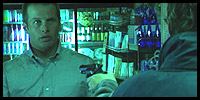 To discuss all of the fascinating layers and themes in "November" would require an essay longer than a conventional review, and in order to do that the essay would need to dive into spoiler territory. In the interest of composing a review that can be safely read by prospective viewers deciding whether the film is worth seeking out or not, what is written will need to be a little vague. Separated into three sections, each with its own title card—"Denial," "Despair" and "Acceptance"—that clarify themselves by the devastating final sequence, "November" begins for the first forty minutes or so as a classic mind-bender of a psychological thriller that is scarier and more harrowing than anything found in, for example, the bland recent "The Skeleton Key." There is an unshakable feeling of voyeurism in what director Greg Harrison fills his scenes with, making such potentially banal settings as a classroom, a restaurant and an average-looking apartment ominous beacons of threat. Paying close attention to every frame can only work in the viewer's favor, as the first hour or so is overflowing with details and happenings big and small that eventually reveal an ingenious master plan.
To discuss all of the fascinating layers and themes in "November" would require an essay longer than a conventional review, and in order to do that the essay would need to dive into spoiler territory. In the interest of composing a review that can be safely read by prospective viewers deciding whether the film is worth seeking out or not, what is written will need to be a little vague. Separated into three sections, each with its own title card—"Denial," "Despair" and "Acceptance"—that clarify themselves by the devastating final sequence, "November" begins for the first forty minutes or so as a classic mind-bender of a psychological thriller that is scarier and more harrowing than anything found in, for example, the bland recent "The Skeleton Key." There is an unshakable feeling of voyeurism in what director Greg Harrison fills his scenes with, making such potentially banal settings as a classroom, a restaurant and an average-looking apartment ominous beacons of threat. Paying close attention to every frame can only work in the viewer's favor, as the first hour or so is overflowing with details and happenings big and small that eventually reveal an ingenious master plan.
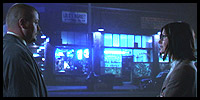 As Sophie, Courteney Cox is outstanding in a difficult performance of quietly simmering guilt, fear and regret that is ready to explode at any time. She is on screen from the first scene onward, and carries it off by creating a very real, distinguishable character that will instantly make you forget she was ever Monica Geller on TV's "Friends." This is what stretching as an actress and working because of passion is called, and it has paid off handsomely for an actress smartly looking to move in different creative directions (the film's entire production budget was a measly $150,000, or roughly one-sixth of Cox's one-episode salary on "Friends"). As Sophie's devoted boyfriend Hugh, the invaluable James LeGros (2004's "Catch That Kid") is so charismatic opposite Cox that the two of them fulfill exactly what was intended—an ominous psychological tale that is also a poetic and tragic love story, their relationship, for various reasons left to be discovered, cut dramatically short. Other supporting cast members are strong in small roles, with Nora Dunn (2003's "Runaway Jury"), as Sophie's concerned therapist; Anne Archer (2005's "Man of the House"), as Sophie's mother, and Nick Offerman (2005's "Miss Congeniality 2: Armed and Fabulous"), as Officer Roberts, whom Sophie confides in about the robbery-murder investigation.
As Sophie, Courteney Cox is outstanding in a difficult performance of quietly simmering guilt, fear and regret that is ready to explode at any time. She is on screen from the first scene onward, and carries it off by creating a very real, distinguishable character that will instantly make you forget she was ever Monica Geller on TV's "Friends." This is what stretching as an actress and working because of passion is called, and it has paid off handsomely for an actress smartly looking to move in different creative directions (the film's entire production budget was a measly $150,000, or roughly one-sixth of Cox's one-episode salary on "Friends"). As Sophie's devoted boyfriend Hugh, the invaluable James LeGros (2004's "Catch That Kid") is so charismatic opposite Cox that the two of them fulfill exactly what was intended—an ominous psychological tale that is also a poetic and tragic love story, their relationship, for various reasons left to be discovered, cut dramatically short. Other supporting cast members are strong in small roles, with Nora Dunn (2003's "Runaway Jury"), as Sophie's concerned therapist; Anne Archer (2005's "Man of the House"), as Sophie's mother, and Nick Offerman (2005's "Miss Congeniality 2: Armed and Fabulous"), as Officer Roberts, whom Sophie confides in about the robbery-murder investigation.
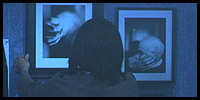 Masterful digital photography by Nancy Schreiber (2000's "Book of Shadows: Blair Witch 2"), the deep blues, blacks and reds popping off the screen to suffocate Sophie's imploding surroundings (each section has its own color scheme), and a grimly memorable music score by Lew Baldwin that is perfectly mixed with the movie's tricky juggling of sound and silence, are the final chess pieces in a one-part nightmarish, one-part lyrical, one-part emotionally sublime motion picture of stunning eloquence and wisdom. Director Greg Harrison knows and captures the feeling of loss and the sense of something being taken away in startlingly understated and honest ways that makes his movie more than just a study in style.
Masterful digital photography by Nancy Schreiber (2000's "Book of Shadows: Blair Witch 2"), the deep blues, blacks and reds popping off the screen to suffocate Sophie's imploding surroundings (each section has its own color scheme), and a grimly memorable music score by Lew Baldwin that is perfectly mixed with the movie's tricky juggling of sound and silence, are the final chess pieces in a one-part nightmarish, one-part lyrical, one-part emotionally sublime motion picture of stunning eloquence and wisdom. Director Greg Harrison knows and captures the feeling of loss and the sense of something being taken away in startlingly understated and honest ways that makes his movie more than just a study in style.
 In a year that, cinematically speaking, has featured a dismal dearth of originality, here is a film reaffirming that ideas and creativity more often than not are found in the smaller releases that, for one reason or another, big studios have passed on in favor of the umpteenth television-to-feature remake and pointless sequel. "November" is the real deal, subtle and scary and touching and profound and unforgettable all at once, its off-kilter aspects chipping away at the viewer's consciousness via airtight filmmaking and force of will. The entire experience is something of a revelation.
In a year that, cinematically speaking, has featured a dismal dearth of originality, here is a film reaffirming that ideas and creativity more often than not are found in the smaller releases that, for one reason or another, big studios have passed on in favor of the umpteenth television-to-feature remake and pointless sequel. "November" is the real deal, subtle and scary and touching and profound and unforgettable all at once, its off-kilter aspects chipping away at the viewer's consciousness via airtight filmmaking and force of will. The entire experience is something of a revelation.
|
© 2008 by Dustin Putman |














